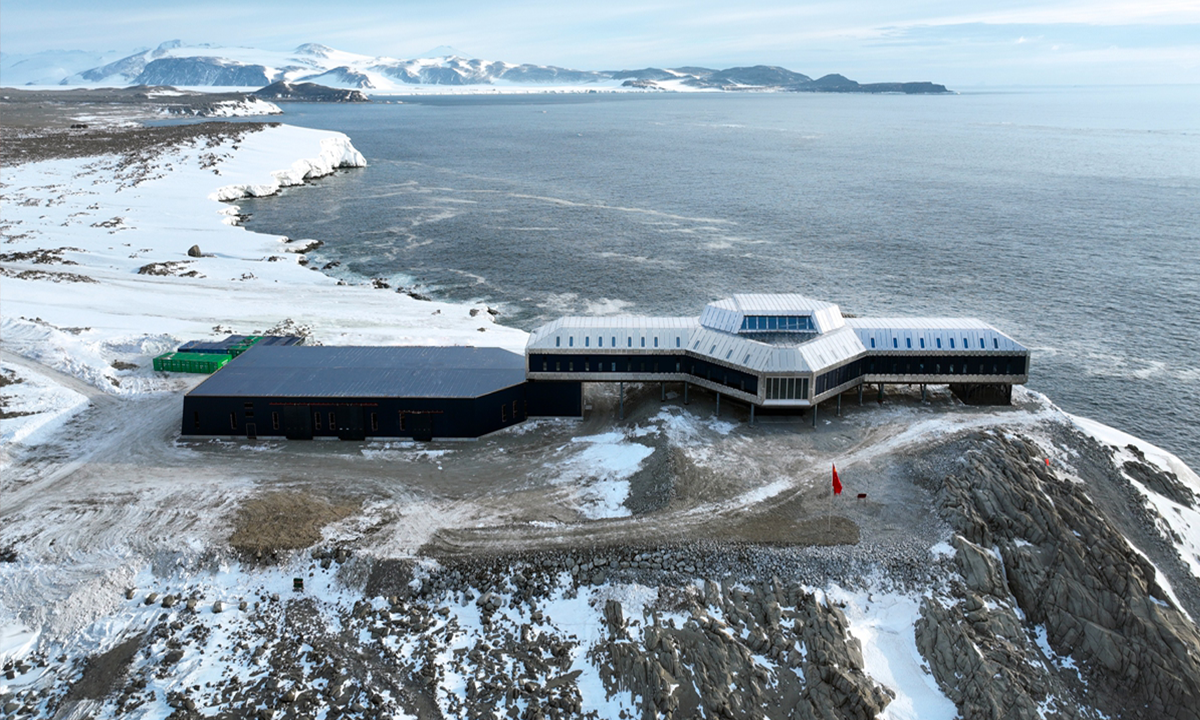
Qinling Station, China's fifth research station in Antarctica, starts operation on February 7, 2024. Photo: Courtesy of Chinese Ministry of Natural Resources
China's Qinling Station in Antarctica, the country's fifth research station on the continent, started operation on Wednesday. The research facility is expected to help enhance mankind's scientific understanding of Antarctica, provide a platform for China to cooperate with other countries in scientific expeditions and promote peace and sustainable development in the region, a Chinese Foreign Ministry spokesperson said on Wednesday.
However, some Western media have hyped "intelligence concerns" by claiming that the station is located in an "excellent position" to gather intelligence information about Australia and New Zealand.
In response, Wang Wenbin, spokesperson for the Chinese Foreign Ministry, also said at Wednesday's press conference that as a consultative country to the Antarctic Treaty, China has always carried out its activities in accordance with the relevant provisions of the Antarctic Treaty system. The station construction fully complies with international rules and procedures, and will contribute to enhancing human understanding of Antarctica, Wang noted.
Qinling Station can accommodate 80 people in summertime and 30 in wintertime, according to the Polar Research Institute of China, which was in charge of its construction, according to media reports. The research facility fills the gap in China's research in the Ross Sea region of Antarctica, the Global Times learned from experts, who noted that as China's third perennial winter research station in the region, the station will play a major role in China's research on the continent.
The Global Times learned that the station will make full use of the geographical advantages of the interglacial lake near Terra Nova Bay to the east and the marine laboratory of the station to focus on oceanographic observation and research, as well as atmospheric science, glaciology, geology and space physics.
Chinese President Xi Jinping on Wednesday sent a congratulatory letter on the completion of the building of the Qinling Station and its operation in Antarctica.
Xi, also general secretary of the Communist Party of China (CPC) Central Committee and chairman of the Central Military Commission, extended his sincere greetings and Chinese New Year wishes to people working for polar research, according to the Xinhua News Agency.
Noting that this year marks the 40th anniversary of China's polar expedition, Xi said China's polar research cause has achieved fruitful results and the completion of the Qinling Station will provide a strong guarantee for scientists in China and around the world to continue to explore the mysteries of nature and bravely ascend the peak of science.
Xi called for better understanding, protection and utilization of the polar regions to make new and greater contributions to humanity and the building of a community with a shared future for mankind.
Liu Yanhui, the consultant chief architect of the China Architecture Design and Research Group and the general director of the design of the new station project, told the Global Times that the main structure of the new station was built with the steel structure fully assembled, while the outer protective structure uses prefabricated curtain wall units and the facility has multiple units for offices, scientific research, accommodations and other purposes,
The design of the new station takes into account logistics operation, scientific observation, international cooperation, environmental protection and other factors, forming a multi-circle global investigation model centered on the research station, whose inspection range can reach 300 to 500 kilometers.
Liu introduced that the new station makes great use of smart technologies. The station adopts data management and remote synchronization based on satellite communication systems, has intelligent operation and maintenance systems such as automatic detection and emergency response, and private network systems such as intelligent communication and data acquisition, so as to realize intelligent scientific research.
The marine laboratory of the new station, which reaches international standards, can realize long-term continuous observation and monitoring of the interglacial lake of Terra Nova Bay, carry out online monitoring and data transmission of the offshore marine environment as well as sample pretreatment and analysis experiments.
In addition, the new station adopts an energy microgrid management system that combines renewable energy and traditional energy, giving priority to clean energy such as wind and solar. New energy such as wind and solar account for more than 60 percent of the station's energy, Liu noted. Also, the station integrates advanced technologies such as microgrid monitoring and energy management platforms to make the operation greener and more environmentally friendly.
He Jianfeng, a researcher at the Polar Research Institute, told the Global Times that the establishment of the station will further expand international cooperation in Antarctic scientific research. "In the future, we will cooperate with the research stations of neighboring countries such as the US, New Zealand, Germany and Italy to promote the building of the marine laboratory of Qinling Station into an international cooperation platform, and strive to promote the cooperation among the research stations of countries along the Ross Sea to become a model of Antarctic research cooperation," He noted.
"China's current three Antarctic perennial stations, the Changcheng, Zhongshan and Qinling stations, respectively correspond to the Atlantic Ocean sector, the Indian Ocean sector and the Pacific Ocean sector. The Qinling Station will fill the gap in China's long-term observation in the Pacific Ocean sector, so as to build a system for the long-term observation network in Antarctica, and better answer frontier scientific questions such as those concerning climate change, ice and snow and the mechanisms of ecological environmental change," He said




